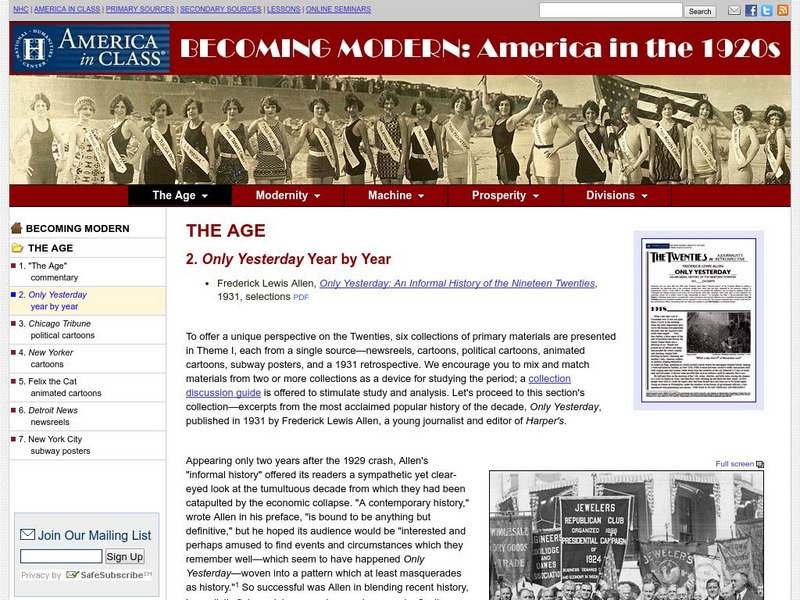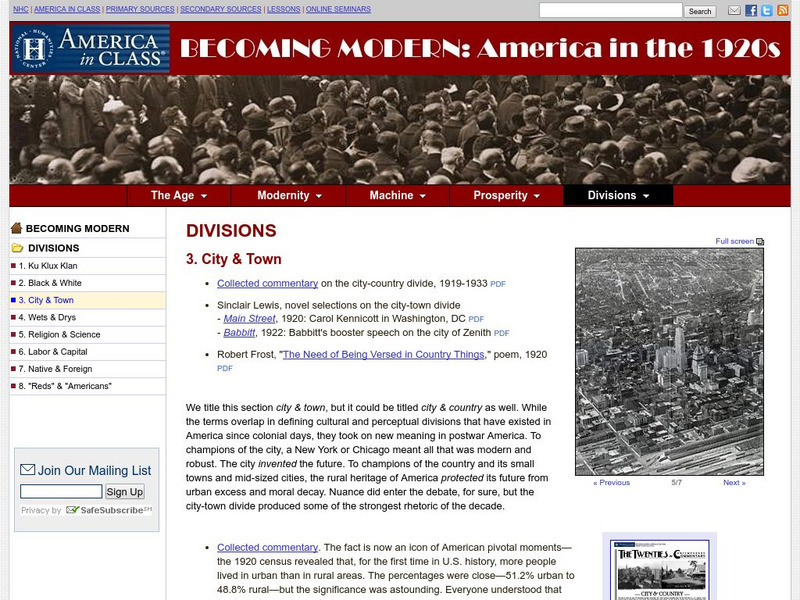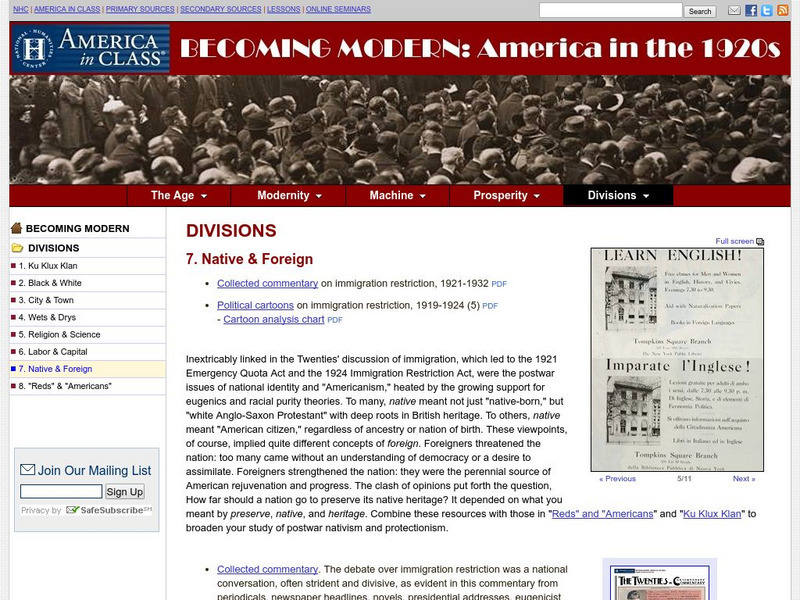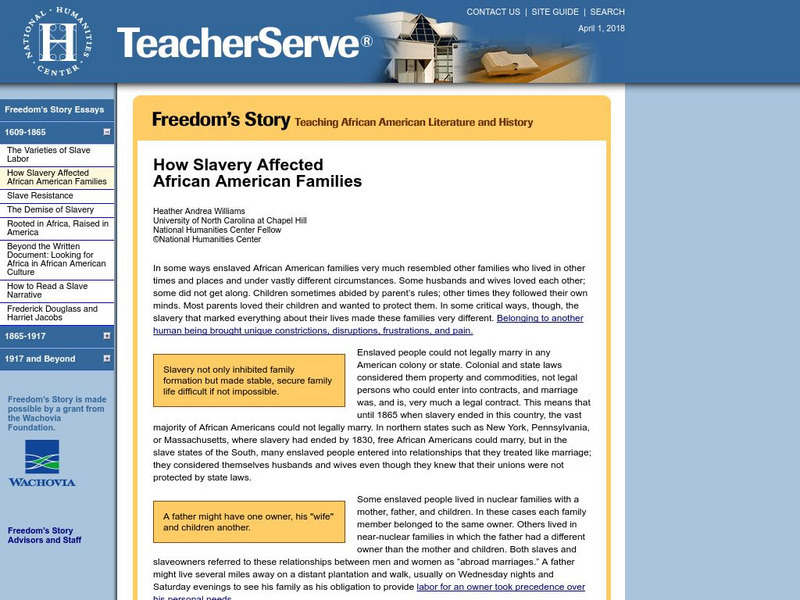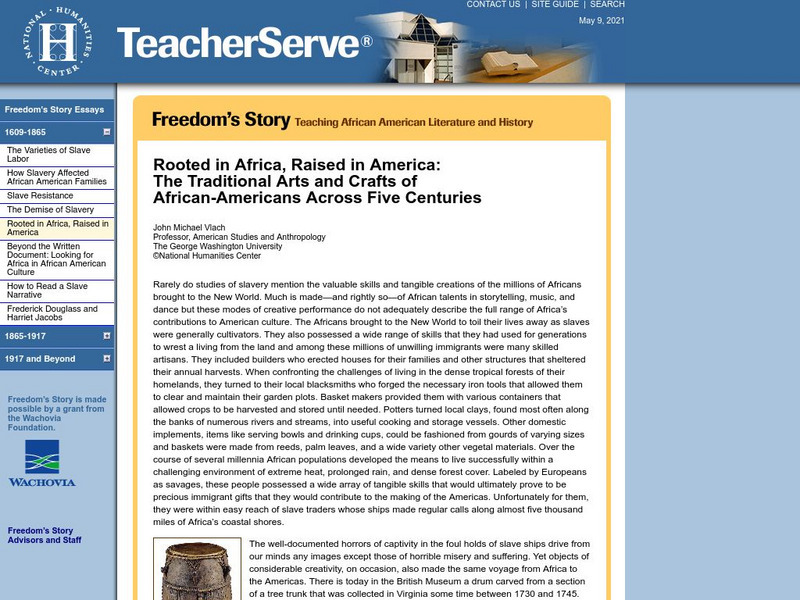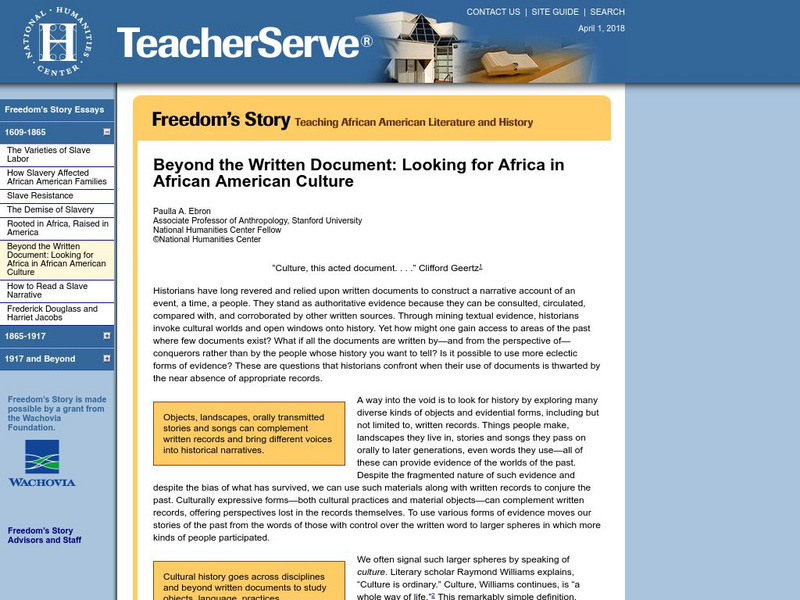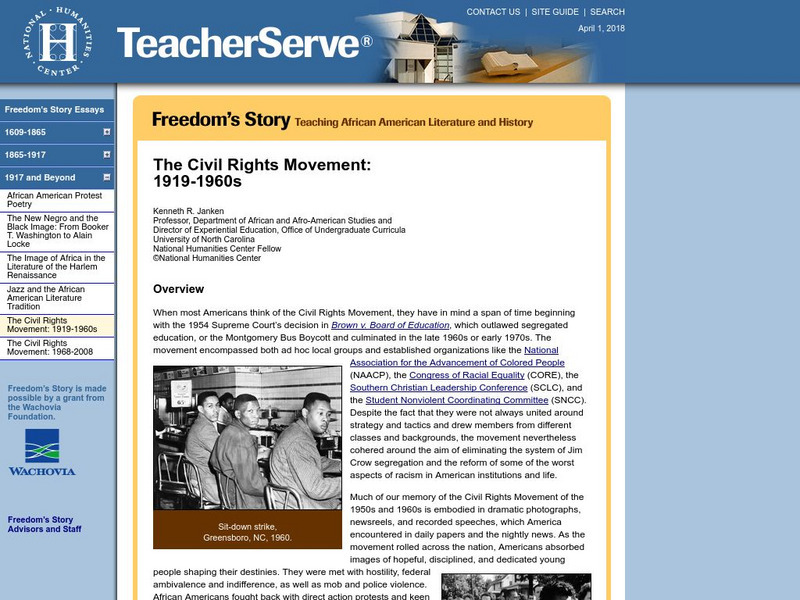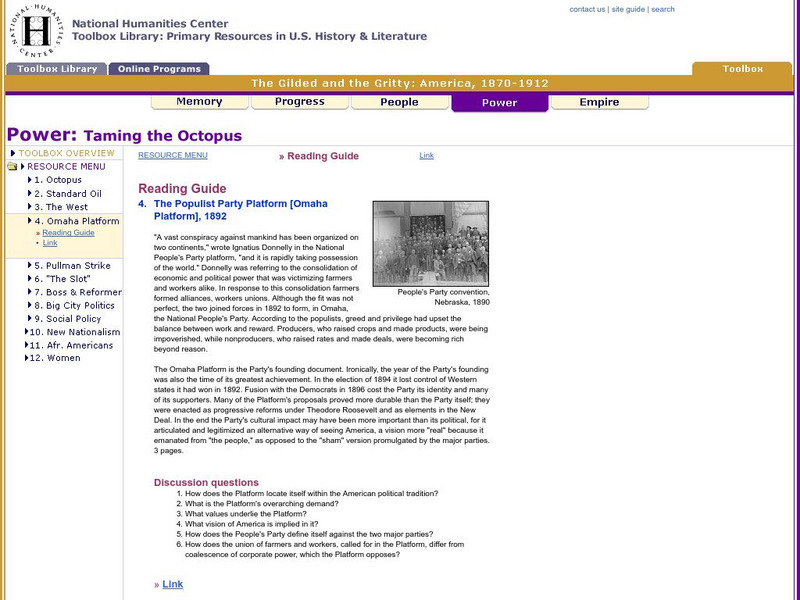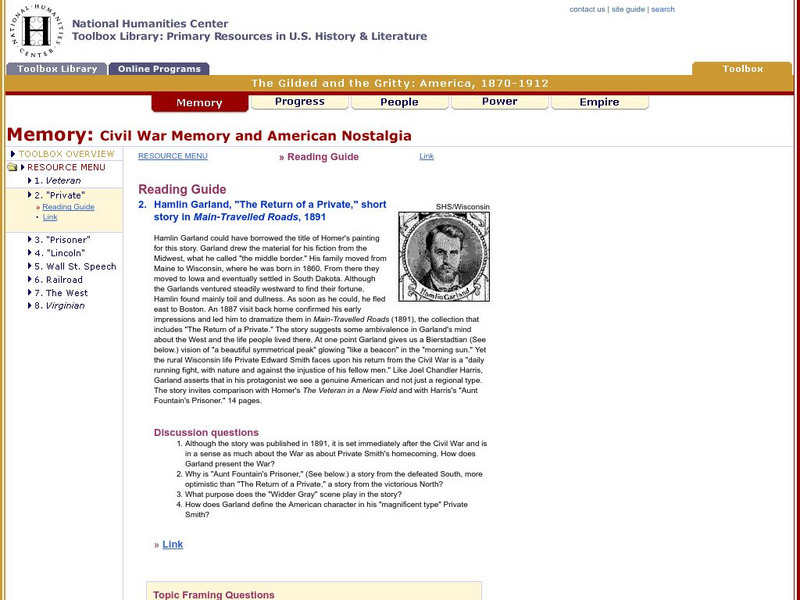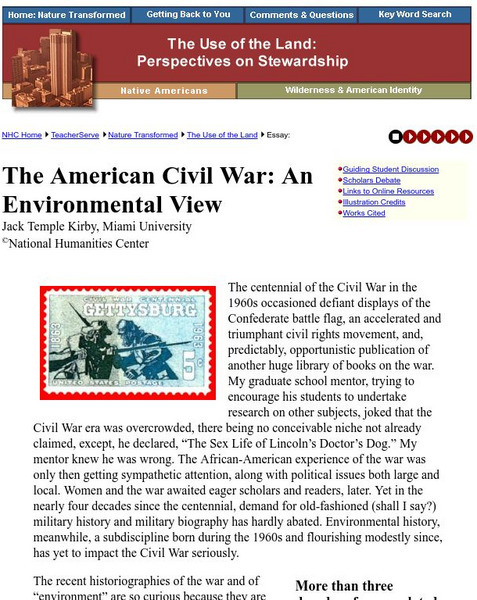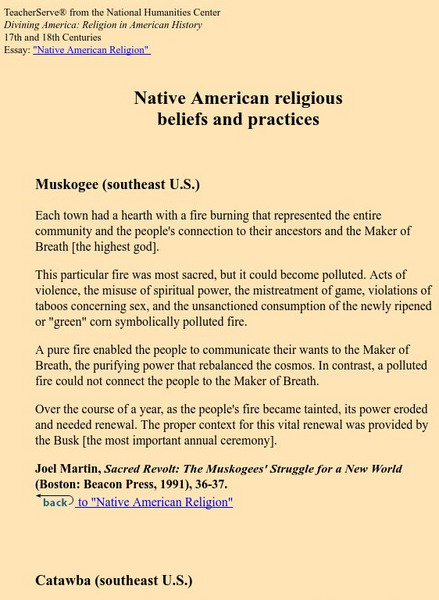Hi, what do you want to do?
National Humanities Center
National Humanities Center: Toolbox Library: America in 1850: Frederick Douglass
The National Humanities Center presents collections of primary resources compatible with the Common Core State Standards - historical documents, literary texts, and works of art - thematically organized with notes and discussion...
National Humanities Center
National Humanities Center: America in Class: America in the 1920s: The Age
The National Humanities Center presents collections of primary resources compatible with the Common Core State Standards - historical documents, literary texts, and works of art - thematically organized with notes and discussion...
National Humanities Center
National Humanities Center: America in Class: America in the 1920s: Only Yesterday Year by Year
The National Humanities Center presents collections of primary resources compatible with the Common Core State Standards - historical documents, literary texts, and works of art - thematically organized with notes and discussion...
National Humanities Center
National Humanities Center: America in Class: America in the 1920s: Machine: Radio
The National Humanities Center presents collections of primary resources compatible with the Common Core State Standards - historical documents, literary texts, and works of art - thematically organized with notes and discussion...
National Humanities Center
National Humanities Center: America in Class: America in the 1920s: City & Town
The National Humanities Center presents collections of primary resources compatible with the Common Core State Standards - historical documents, literary texts, and works of art - thematically organized with notes and discussion...
National Humanities Center
National Humanities Center: America in Class: America in the 1920s: Native & Foreign
The National Humanities Center presents collections of primary resources compatible with the Common Core State Standards - historical documents, literary texts, and works of art - thematically organized with notes and discussion...
National Humanities Center
National Humanities Center: Teacher Serve: How Slavery Affected African American Families
University of North Carolina at Chapel Hill professor Heather Andrea Williams discusses the lives of enslaved African American families and how slavery made their lives different from other families.
National Humanities Center
National Humanities Center: Teacher Serve: Slave Resistance
Essay explores the beginnings of slave resistance and its various forms. Includes ideas for guiding a student discussion.
National Humanities Center
National Humanities Center: Teacher Serve: The Demise of Slavery
In this essay, J. William Harris, Professor of History at the University of New Hampshire, explains the developments that brought about the demise of slavery.
National Humanities Center
National Humanities Center: Teacher Serve: The Traditional Arts and Crafts of African Americans Across Five Centuries
Detailed essay provides an overview of Africa's contributions to American culture while discussing how basket makers, potters, and quilters helped preserve American history through their works.
National Humanities Center
National Humanities Center: Teacher Serve: Beyond the Written Document: Looking for Africa in African American Culture
Paulla A. Ebron, professor at Stanford University, takes a look at how objects, landscapes, orally transmitted stories, and songs along with written documents can be used to study cultural history.
National Humanities Center
National Humanities Center: Teacher Serve: Frederick Douglass and Harriet Jacobs: American Slave Narrators
Lucinda MacKethan, English professor at North Carolina State University, offers a comparison of two classic slave narratives: Frederick Douglass's 1845 Narrative of the Life of Frederick Douglass: an American Slave and Harriet Jacobs's...
National Humanities Center
National Humanities Center: Teacher Serve: The Civil Rights Movement: 1919 1960s
Article provides an overview of the Civil Rights Movement in America between 1919 and the 1960s with detailed discussion on racial equality, nonviolence and passive resistance, and segregation.
National Humanities Center
National Humanities Center: Toolbox Library: The Heroic Couplet: Its Rhyme and Reason
Lengthy academic essay that argues that traditional poetry, including the heroic couplet, is still relevant in the modern world. While this is discussed, the history of the heroic couplet is provided. A good definition of the term with...
National Humanities Center
National Humanities Center: Toolbox Library: The American Negro and His Fatherland
Read excerpts from this speech given by Re.v. Henry McNeal Turner, a bishop in the AME church, who, by the late 1890s, supported the Back to Africa movement and felt that African Americans would have a better life in Africa.
National Humanities Center
National Humanities Center: Toolbox Library: Power: Taming the Octopus: The Populist Party Platform, 1892
The 1892 platform of the Populist Party that argued for significant changes to improve the economic condition of farmers and industrial workers. Included are discussion questions and a link to the exact wording of the platform.
National Humanities Center
National Humanities Center: Toolbox Library: Desegregation Integration, Making of African American Identity: V.3
This resource presents James Farmer (1920-1999), a major figure in the civil rights movement of the 1950s and '60s, and the distinction he draws between integration and desegregation, two terms often used interchangeably and often confused.
National Humanities Center
National Humanities Center: Toolbox Library: Separation and Power, Making of African American Identity: V. 3
An essay that examines the relationship between racial separation and power. In this essay Stokely Carmichael advocates for the coalescence of political and economic power within the black community in a way that liberates and insulates...
National Humanities Center
National Humanities Center: Toolbox Library: "The Private," the Gilded and the Gritty: America, 1870 1912
Hamlin Garland's short story, "The Return of a Private", that describes the post-Civil War conflicts for western farmers with nature and with other settlers.
National Humanities Center
National Humanities Center: Teacher Serve: The American Civil War: An Environmental View
The telling of the Civil War from an ecological view from the National Humanities Center. The toll of life taken of young men and animals, the devastation of cities, towns, farmland, trees, and forests - all these factors are discussed...
National Humanities Center
National Humanities Center: Teacher Serve: The Rise of Fundamentalism
The National Humanities Center offers an essay on the definition and discussion of generic fundamentalism and historic fundamentalism, with suggestions on how to guide student discussion.
National Humanities Center
National Humanities Center: Teacher Serve: Native American Religious Beliefs and Practices
Brief descriptions of the religious practices of six Native American groups, including the Iroquois and the Muskogee. A great resource from the National Humanities Center.







